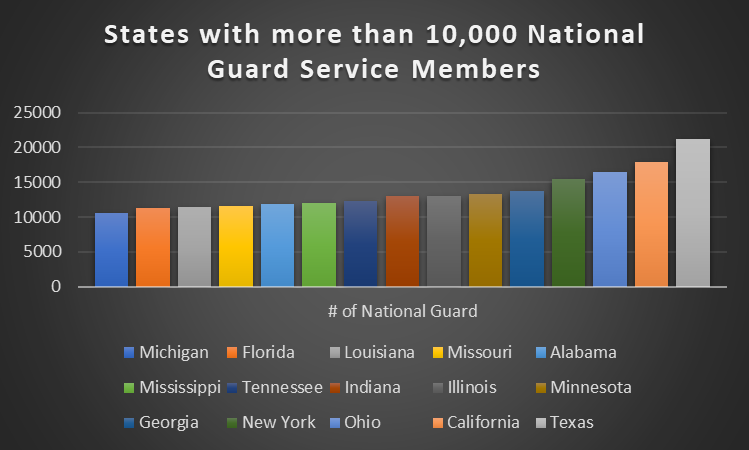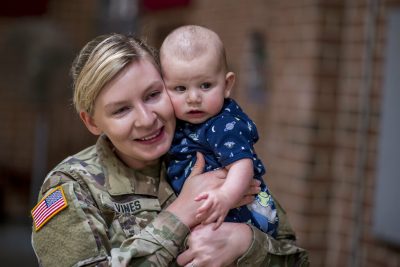Good Reasons for Intentional Outreach
- Many National Guard families are new veteran families who were recently on full-time active service and may be new to your community and to non-military services for individuals with disabilities
- Some National Guard are actually full-time military and move from state-to-state for duty
- For many National Guard families, their commitment to the military and its mission is much more than a part-time job. Like active-duty families, they turn mostly to the military for information and support:
- Family Assistance Centers, the main support program for the National Guard are often not aware of parent centers and their services, so when Guard families contact them for community services your center isn’t on their list
- National Guard family members with a disability are not eligible for the Exceptional Family Member Program until their service member is called to active federal duty. There is no comparable program through the National Guard Family Support system. If your outreach to military families has concentrated on installation-based programs like EFMP, National Guard families will not have heard of your center through that or other installation-based services
What to Know
There are close to 430,000 Army and Air National Guard soldiers and airmen stationed across the United States. Of these, 65% have children. 15 of the 50 states have more than 10,000 National Guard service members.[i]

The National Guard isn’t that part-time anymore. Training days total on average over 2 months per year, the deployment cycle remains heavy, and short-notice deployments affect a family’s ability to plan ahead. Federal deployments usually last a minimum of 12 months, while state active duty ranges from two weeks to two months.
There is no plan for cutting back on this level and tempo of deployments. Secretary of the Army Mark T. Esper stated in an article on Army.mil “The Guard is no longer a strategic reserve. It is an operational force”.
Concerns
National Guard families, like active-duty families, are often under the most stress when the service member is deployed. Stress is compounded by isolation from other military families; unlike active duty families who lived on or near installations, National Guard families are spread across a state. They are also remote from, or not eligible for installation-based programs for childcare, school supports[ii] and child and youth activity programs.
- Unless the service member is called to federal active duty, the family is not eligible for the Exceptional Family Member Program (EFMP). When the service member is on federal active duty, the family may be remote from any EFMP Family Support office and must receive services by phone or email.
- Financial: State active duty deployments (frequently for emergencies such as hurricanes, floods, and their aftermaths) may have delays for state pay, which can put families at financial risk.
- Medical: State activations do not have any eligibility for Federal active duty benefits, such as TRICARE’s ECHO program, TRICARE ABA services, or respite care
- Childcare: “Guard and Reserve servicemembers do not have the same access to childcare benefits active duty personnel have. This makes it difficult for a Guard or Reserve family to transition from a two- parent household to essentially a single-parent household.
How you can support National Guard Families: Outline of Resources
Begin by connecting with your state’s Family Assistance Program.
Each state has a Family Assistance Coordinator who organizes a team of Family Assistance Specialists. Specialists may serve specific geographic areas or handle a certain type of assistance (financial help or benefits information, for example). The Family Assistance Coordinator is at a Family Assistance Center, located in a National Guard installation. There may be one or more such centers in each state. Coordinators and Assistance Specialists are civilians who work for the National Guard.
The Family Assistance Coordinators can be a very valuable connection for your center. In 2018, Family Assistance Centers fielded more than 1.6 million calls for referrals and resources; information on community services was one of the top three requested services!
Family Assistance Coordinators and Family Assistance Specialists can:
- Refer families to your services
- Be your contact(s) to organize in-person and online parent trainings
- Invite you to resource fairs and similar events
- Share your events and resources via their social media
- Facilitate your connection(s) with other National Guard support programs like Yellow Ribbon Reintegration
Fresh Ideas
These suggestions may be particularly attractive to National Guard families feeling isolated by the “single-parenting” effect of trainings and deployments, or their lack of connections within their civilian communities.
- Parent Support Groups
- Events or Groups with activities for children, or parents and children together
- Youth Support and Empowerment Groups
- Parent to Parent-type programs with match ups
Promote these programs on your own social media during deployments and ask your contact at the Family Assistance Center to help spread the word.
- Consider building an online support discussion group aimed at military-connected families with deployed service members. Which topics might be super-useful for the “suddenly single-parent” family? You might partner with other organizations to invite guest speakers to discuss their services.
- Yellow Ribbon Reintegration Program: it may be useful to partner with them for pre- and during- deployment events and activities, as families who are getting ready for deployment often actively look for helpful community services. Find a link for the program on your state’s National Guard website.
- Consider outreach to National Guard families
during pre-deployment and deployment periods:
- You can find out when deployments occur with a Google news alert from Google.
Keyword suggestion: “National+Guard deployment Your State”. The “+” sign attaches “National” to “Guard” and eliminates the problem of getting hundreds of hits with the words “national” or “guard” in the text!
- You can also monitor the news from your state’s National Guard website (use keyword “deployment” in the search bar).
- Follow that site on Twitter or Facebook for updates
Example: in 2018, this article was posted on the Illinois National Guard website “Specialized Illinois National Guard Unit Mobilizes for Afghanistan”
- If you have a military resources page add this new area on Military OneSource: Joint Services Support for the National Guard
Tried-and-true outreach tips
- Add military-focused language to your usual training or event invitations: “Parents: are either or both of you in the National Guard or Reserves? This training can assist you!” You might alternate “civilian” and “military-connected” language in your social media posts.
- Tag resources on your website as “military”. Particularly
useful resources might be on:
- Childcare
- Adult day centers
- Respite care
- Branch resources to re-post or link. The last 6 resources have downloadable parent handouts for your center’s use. Each handout has space to add your center’s logo and contact information.
- Family Care Plans
- Great New Addition to the Exceptional Family Member Program
- Help Military Families Prepare Their Child’s School for Deployment [with handout]
- 16 Financial Resources for Military Families [with handout]
- Help Military Families Prepare Their Child’s School for Deployment [with handout]
- Help for Grandparents and Other Temporary Caregivers [with handout]
- Medicaid: Referring Military Families to Supports and Services [with handout]
- Extended Care Health Option (ECHO) [with handout]
[i] Defense Manpower Agency
[ii] See Role of the School Liaison Officer (SLO) and [ii] Just for Military Kids, Teens, and Their Families-Child and Youth Behavioral Counseling

